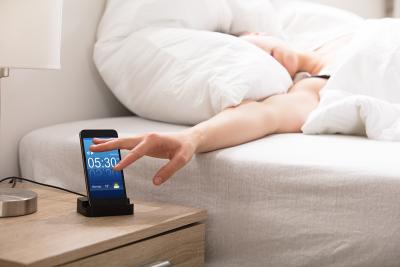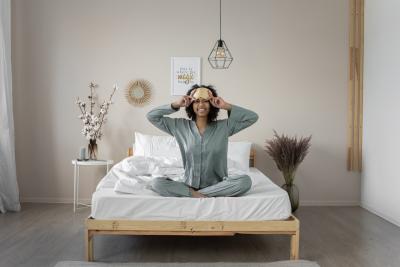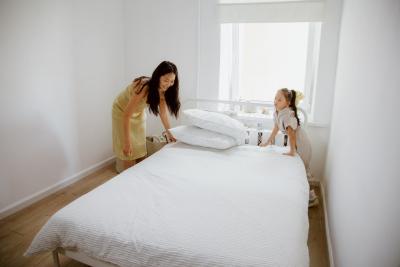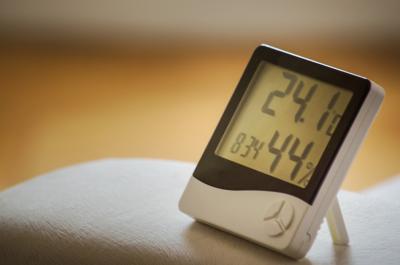Getting a good night's sleep is easy for some, but it can be frustrating for others. Struggling to get to sleep can, in turn, cause issues In your daily life - anyone who's only got a few hours of sleep will be more than aware of how grumpy it can make you during the day. So, how do you get a good sleep that's refreshing and restful enough to make you happy? Well…try taking a look at our Nordic friends!
Nordic countries like Finland and Iceland are regularly voted the 'happiest countries in the world'. Finland takes home the title of the best country for sleep, with residents getting an average of eight hours per night. But what other sleep hacks could we take from our friends in the north?
The 'Scandi sleep method' of using two duvets in bed - one for you and one for your partner - has revolutionised our sleep. This method can help improve sleep by regulating your body temperature and even improving your relationship. With these revolutionary sleep tactics spreading worldwide, we decided to dig deeper into the Scandinavian and Nordic sleep methods and share some unique tips you might never have heard of.
What Scandinavian sleep hacks make for better sleep?
1. Air your duvet, bedsheets and pet beds outside for five hours
Did you know that a staggering 41% of people have never washed their duvet? Since duvets can harbour thousands of dead skin cells, dust mites, and bodily fluids, cleaning your duvet regularly is essential. However, many Scandinavians, including the viral TikToker Cecilia Blomdahl, swear by taking this one step further by airing their duvets, bedsheets, and even their pet's beds outdoors daily.
The cold, dry air effectively removes moisture, preventing the accumulation of this bacteria build-up and any yellow stains, musty smells, or even the growth of mould and mildew. Moreover, sunlight also has natural antibacterial properties and can help remove stains.
Moreover, airing your duvet with the bedsheet still on can also help restore the loft - essentially, the fluffiness of a down duvet - in your duvet, making for a more comfortable night's sleep. Ideally, you should air your duvet with the bedsheet still on every day as Cecilia and other Scandinavians do; however, if this is unachievable, make it part of your weekly schedule and place it outside for at least five hours.
2. Make sure to air out your pillows
We found that 1 in 3 people had kept their pillow for more than two years, which is longer than the average pillow's lifespan. But to keep your pillow as fresh as possible in those two years, we recommend airing out your pillows and bedding.
Your pillows can also hold moisture, particularly from your hair and face, so airing those can remove that moisture and, subsequently, increase the lifespan of your pillows, which is already relatively short at around two years.
If you sleep in face and hair masks or have a nighttime beauty routine, the moisture and oils can transfer to your pillowcase. The same can be said for sleeping with wet hair dampening your pillow. And, without airing them, that dampness can become mould and mildew.

3. Embrace the cold for 20 minutes during the day
It's common for babies to sleep outside (even in minus-degree weather) in countries such as Sweden, Finland and Denmark. One Danish musician recently posted that her baby tends to sleep most outside, harking back to the longstanding tradition.
Bursts of cold air and getting outside in the winter have many benefits, even though you might want to wrap up warm in the house. Insomniacs - people who struggle to fall asleep and stay asleep - can experience better sleep from experiencing the cold. One study found that replicating the cold air, with cold caps placed on their head when sleeping, helped to improve their sleep quality during the night.
This is because temperature plays an essential role in our sleep, with our body temperature slightly dipping and remaining lower until wake time. The cold air helps to initiate that change to sleep. Exposure to cold can also help improve appetite and even inflammation, which are other things that could impact sleep.
4. Keep the room cold and open your window for 15 minutes before sleep
The above tip ties into this: keeping the room cold and inviting the cold in. Rooms that are too hot can dramatically affect your sleep, particularly for people with insomnia, as mentioned earlier, who struggle to regulate their body temperature to sleep. Studies have previously found that heat and humidity affect sleep, whereas cold does not, suggesting that a cold room is the best option for someone struggling to get a good night's rest.
If you cannot get outside in the fresh air, open your window for a minimum of 15 minutes, as it is vital to get the fresh air into your home and to your bed to see those sleep improvements.
5. Take your lunchtime drink outside
Further to that, why not take your lunchtime tea or coffee outside? Several Scandinavians head out with their coffee, some even in minus-20-degree weather. You must prioritise time outdoors, and even if that is a struggle, 20 minutes with your coffee outside at lunchtime should help regulate your circadian rhythm, a 24-hour internal body clock that tells you when to sleep and wake up.
The dose of daylight will naturally increase your cortisol levels, which will help you feel alert during the daytime. So, come nighttime, those levels will naturally dip, and your body will start to produce melatonin, otherwise known as your sleep hormone.

6. Visit your local sauna, but make sure to time it right
In Finland, saunas are an integral part of the cultural experience. The Finnish typically use them for muscle relaxation after a strenuous day or as a social activity with friends; however, not many people know that there are many sleep benefits. So much so that 83% of those who regularly used a sauna noticed positive improvements in their sleep.
The key to improving your sleep is to finish your visit an hour or two before you plan on sleeping. When you enter a sauna, your body initiates a fight-or-flight response, directing blood flow to the skin to cool down, resulting in significant sweating. Exiting the sauna prompts a rapid cooldown, lowering your core temperature and signalling it's time for sleep.
However, if you're can't visit a sauna every night due to parental demands or the cost-of-living crisis. In that case, you can replicate some advantages by taking a hot, steamy bath one hour before bedtime to initiate the winding down process for better sleep.
It would help if you also considered adding a few drops of calming essential oils like lavender, chamomile, or eucalyptus to your bath to lower your cortisol levels. The combination of warm water, steam, and aromatherapy creates a more cost-effective approach to relaxation, which still has many sleep-related benefits.
7. Sleep in a separate duvet from your partner
During the night, you might get too hot or cold and use your duvet when needed. But adding another body to the mix, with different sensitivities to heat and cold, can be a recipe for disaster. Regulating your temperature is crucial for sleep. This is why many Scandinavians sleep with two duvets - one for each person.
The benefits certainly outweigh any cons, as you can regulate your temperature. If you are unable to do so, you can begin to experience insomnia. Perhaps you need a higher tog duvet as you are more sensitive to the cold than your partner?
A restless partner can also lead to decreased sleep quality, with partners waking up more during the night if the person they sleep with tosses and turns. But, if you have your duvet, you are less likely to feel these turns as they have their duvet to do whatever they want. This is important as co-sleeping with your partner offers many benefits, and partners who sleep together tend to spend more time in REM sleep (deep sleep), which is essential for your mental health. So, if you can minimise sleep disruptions and stay in the same bed, it's a wonder we aren't all doing this.
Don't forget about your mattress!
If all our tips haven't worked, consider investing in a new mattress to help improve your sleep. A pocket sprung mattress has thousands of Individual springs In their own pocket that allows them to move Independently from each other, making it a must-have if your partner is a restless sleeper!
Alternatively, you might discover that a memory foam mattress is the perfect sleep partner you never knew you needed! Find out more about the range of mattresses available here on Happy Beds, alongside plenty of valuable tips for finding the perfect mattress in our mattress buying guide!












